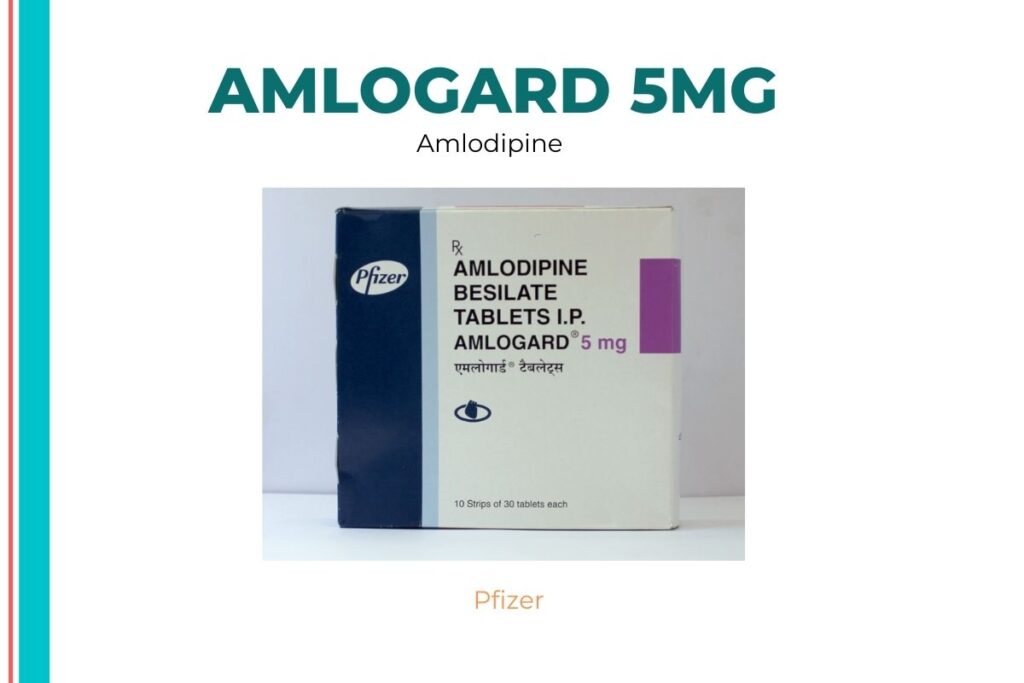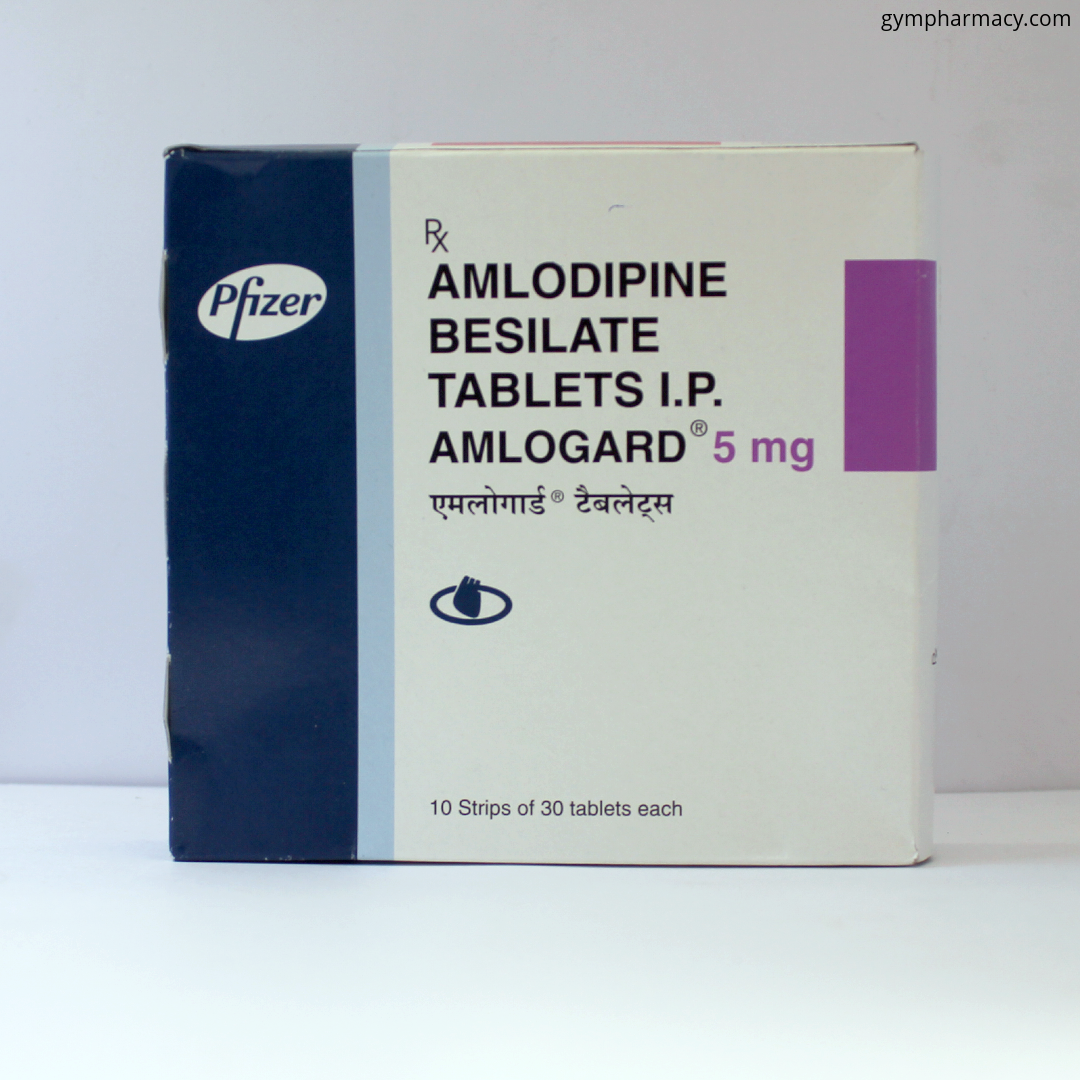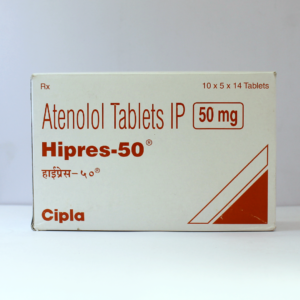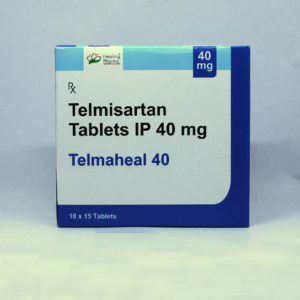Amlogard 5mg
Amlogard 5mg belongs to the calcium channel blocker class of drugs, which are used to treat hypertension (high blood pressure) and angina pectoris (chest pain). Hypertension (high blood pressure) is a long-term or chronic disorder in which the blood exerts a large amount of force against the arterial walls. The heart has to work harder to pump blood when the blood pressure is high.
Amlogard 5mg is made up of Amlodipine, a calcium channel blocker that works by relaxing blood arteries. This lessens the workload on the heart and allows it to circulate blood more efficiently throughout the body. As a result, it aids in the reduction of high blood pressure, lowering the risk of heart attack or stroke.
Take Amlogard 5mg with a full glass of water, with or without food, as directed by your doctor. Depending on your blood pressure, Amlogard 5mg may be taken alone or in conjunction with other blood pressure medications. If you’re using any additional anti-hypertensive medication, let your doctor know. Common side effects include headaches, exhaustion, and swelling ankles, which normally go away after a while. If you’ve ever had a stroke or heart attack, or if you’re taking other blood pressure medications, you should keep a close eye on your blood pressure. It is recommended that you continue to take this medication and not discontinue taking it without first visiting your doctor.
It is recommended that you drink plenty of water while taking this medication. Lifestyle adjustments are especially beneficial in attaining the best results with Amlogard 5mg and maintaining blood pressure control. The mainstay of hypertension treatment is a low-salt diet, daily physical activity (even 20-30 minutes of brisk walking 5 days a week can assist! ), weight loss in obese persons, and so on. If you’ve had an allergic reaction to Amlogard 5mg Tablet 2.5’s, if you’re pregnant or planning to become pregnant, if you’re breastfeeding, if you have liver illness, renal disease, heart failure, a heart valve problem, or if you’ve had a heart attack, tell your doctor.
Amlogard 5mg Tablet uses include high blood pressure (hypertension), heart-related chest pain (angina), and heart attack prevention.

Medicinal Advantages
Amlogard 5mg is a drug that is used to treat cardiac problems such as angina (chest pain) and excessive blood pressure (hypertension). It’s a calcium channel blocker that prevents calcium (ions) from entering the heart, allowing smooth muscles to relax and widen for better blood flow. Amlogard 5mg also helps to avoid abrupt coronary artery spasms (heart blood vessel spasms) and lessens how hard the heart needs to work to circulate blood around the body, lowering oxygen consumption. It increases a person’s tolerance for physical activity and exercise while also maintaining normal blood pressure during exercise. As a result, it protects and maintains the health of your heart.
Use Instructions
Amlogard 5mg can be taken orally with or without food, or according to your doctor’s instructions. With around a glass of water, swallow the entire tablet. It should not be crushed, chewed, or broken. Every day, try to take it on the same day. If you miss a dosage, do not duplicate it.
Storage
Store in a cool, dry location away from direct sunlight.
Amlogard 5mg Tablet Side Effects
The majority of Amlogard 5mg ‘s negative effects do not require medical treatment and fade away with time. Dizziness, lightheadedness, headache, exhaustion, swelling ankles, and nausea are the most prevalent Amlogard 5mg adverse effects. The above side effects do not have to be experienced by everyone. However, if these side effects do not go away, consult your doctor.
Precautions and Warnings in Depth
Without a doctor’s prescription, Amlogard 5mg should not be given to anyone who are allergic to Amlogard 5mg Tablet have low blood pressure (less than 90 mm Hg), have had a heart attack, kidney illness, liver disease, pregnant women or women expecting to get pregnant, or breastfeeding women. Aside from that, it’s not recommended for people who have aortic stenosis (heart valve problem). Although Amlogard 5mg can pass into breast milk, its effect on the newborn is unknown. If you’re using Amlogard 5mg and nursing, it’s best to tell your doctor.
Interactions Between Drugs
Amlodipine may interact with blood pressure medications (benazepril, metoprolol, ramipril, hydrochlorothiazide, etc. ), lipid-lowering medications (atorvastatin, simvastatin, etc. ), erectile dysfunction medications (sildenafil), antibiotics (clarithromycin, erythromycin, rifampin), antifungal medications (itraconazole, ketoconazole) (ibuprofen, aspirin).
Avoid foods heavy in fat or cholesterol to avoid drug-food interactions. Pickles, extra salt on salads, and other salty foods should be avoided in your diet.
People who have cardiogenic shock (when the heart fails to pump enough blood to the body), heart valve problems (stenosis), low blood pressure (hypotension), liver illness, or heart failure should not use amlodipine.
Safety Suggestions
ALCOHOL
To avoid unpleasant side effects such as blood pressure lowering, it is recommended that you do not drink alcohol while taking Amlodipine (hypotension).
PREGNANCY
In pregnancy, amlodipine is classified as FDA Category C. Amlodipine is generally not recommended as the first line of treatment for hypertension in pregnancy due to a lack of evidence. If you have high blood pressure when pregnant, you should see your doctor.
BREAST FEEDING
According to the limited evidence available, amlodipine levels in milk are typically low, and amlodipine levels in the blood of breastfed newborns are undetectable. Breastfed babies have not been demonstrated to be harmed by the use of Amlodipine while nursing. If the mother need Amlodipine, this is not a reason to stop nursing. If you are a nursing mother, you should seek advice from your obstetrician before using Amlogard 5mg Tablet
DRIVING
Drive with caution, as Amlodipine can make you drowsy and impair your driving skills.
LIVER
Take amlodipine with caution, especially if you have or have had liver illness in the past. Depending on your medical condition and response to therapy, your doctor may need to adjust your dosage.
KIDNEY
In individuals with kidney illness, amlodipine is generally safe to give, and dose adjustments are rarely necessary. However, depending on the severity of your ailment, your doctor will determine the right dosage strength.
No habit formation
Advice on Diet and Lifestyle
With a BMI of 19.5-24.9, you can keep your weight under control.
Do at least 150 minutes of regular physical activity or exercise every week, or around 30 minutes most days of the week. This can help you lower your high blood pressure by roughly 5 millimeters of mercury.
Choose a diet high in whole grains, fruits, vegetables, and low-fat dairy.
For most adults, limiting sodium chloride (table salt) intake to 2300 mg per day or less than 1500 mg per day is optimum.
If you drink alcohol, limit yourself to one serving for women and two servings for males.
The best way to reduce your risk of heart disease is to stop smoking.
Chronic stress can raise your blood pressure, so avoid it. To cope with stress and practice mindfulness techniques, try to appreciate and spend time with your loved ones.
Monitor your blood pressure on a daily basis, and if it fluctuates too much, contact your doctor right away.
Include heart-healthy omega 3 fatty acid-rich foods and beverages in your daily diet. Low-fat cooking oils such as olive oil, soybean oil, canola oil, and coconut oil can also assist to lower your blood pressure.
Recommendations
High blood pressure and other cardiac problems are commonly treated with amlodipine.
Amlodipine should be taken at the same time every day to get the most out of it and to improve compliance.
Amlodipine can make you dizzy if you take too much of it. While taking this drug, avoid doing things like driving.
While taking this drug, you may experience a sudden drop in blood pressure, which can cause dizziness. Slowly changing your posture could help you avoid this.
Ankle edema is a common side effect of this medication. If this or other adverse effects are bothersome or persistent, talk to your doctor.
Additional Information : This item is non-refundable.
Glossary of Diseases and Conditions
The force with which our heart pumps blood to all regions of the body is measured by blood pressure. When blood pressure is too high, it is known as hypertension. Hardened arteries (blood vessels) can develop as a result of this illness, reducing blood and oxygen flow to the heart. Angina (chest pain) and heart attack can both be caused by high blood pressure (when blood supply to the heart is blocked). High blood pressure can potentially lead to brain damage (stroke) and kidney failure. A blood pressure monitor can be used to diagnose high blood pressure. The heart’s systolic pressure is the force with which it pumps blood out. Diastolic pressure, on the other hand, is the pressure in your heart while it is at rest between heartbeats. The systolic pressure is 140 mm of Hg, and the diastolic pressure is 90 mm of Hg if your blood pressure is 140/90 mm of Hg. The ideal blood pressure range is 90/60 mm Hg and 120/80 mm Hg.
FAQ’s
If you forget to take an Amlodipine dose, you should take it as soon as you remember. However, try not to miss a dose in the first place, and if your next dose is due, do not take both doses at the same time. Take only one dose of Amlodipine; taking two doses will result in low blood pressure.
As long as your doctor has recommended it, you can safely take amlodipine. High blood pressure, for example, is a lifelong illness that should not be abruptly stopped without seeing a doctor.
Amlodipine can make you feel dizzy. While taking Amlodipine, it is recommended that you avoid driving or operating any heavy machinery. If you feel dizzy or light-headed, you should sit down for a while until you feel better.
Amlodipine is not recommended for persons who have a known allergy to any of the medication’s ingredients. In persons with liver disease, it should be used with caution. It should also be avoided by women who are pregnant in the second and third trimesters.
Amlodipine is unlikely to effect male or female fertility. However, there is insufficient evidence to make a definitive statement. Consult your doctor for the best advice.
Long-term use of amlodipine has been linked to ankle swelling. When sitting for lengthy periods of time, try to keep your feet elevated. If the condition persists, see your doctor and follow his or her advice.
‘Pregnancy induced hypertension’ is a term for high blood pressure that occurs during pregnancy (PIH). Both the baby and the mother are at risk. Very high blood pressure in the mother can lead to seizures (fits), headaches, foot edema, kidney damage, and an increased risk of bleeding during pregnancy and delivery. This can potentially harm the fetus by causing an irregular fetal heart rate, increasing the risk of stillbirth, and resulting in a small infant. As a result, you should have your blood pressure checked on a frequent basis throughout your pregnancy. If you have any concerns about your blood pressure during pregnancy, see your obstetrician.








Leave a Reply
You must be logged in to post a comment.